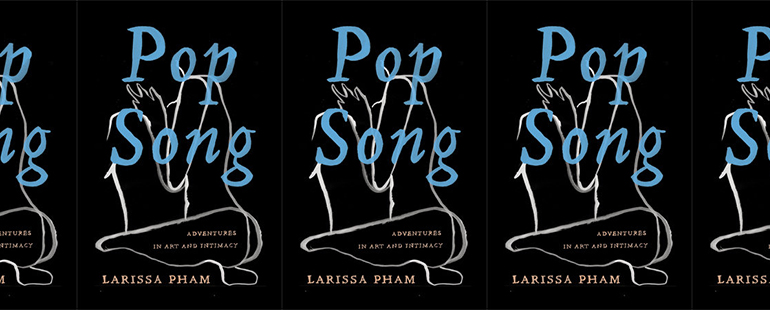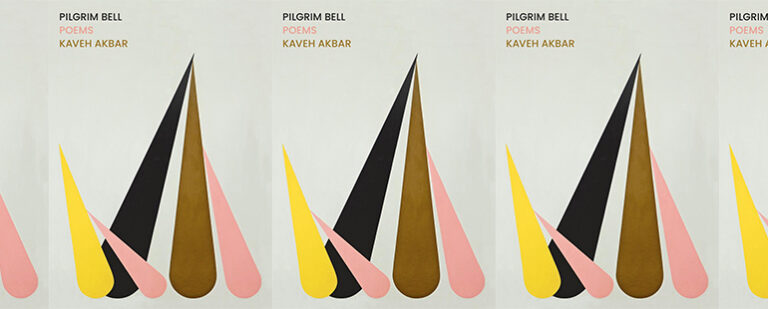Pop Song and the Literary Breakup Album

When I listen to a pop song, I’m shot through with adrenaline. I can never not dance along, flailing my limbs in awkward, uninhibited ways, wondering all the time if my neighbors can see me through open windows, voyeurs to my most passionate moves. I had a similar experience while reading Larissa Pham’s latest book, Pop Song: Adventures in Art and Intimacy, out earlier this summer. With a title like that, there is an expectation the book will delve deeply into aspects of pop music, and yet, there is a startling lack of musical discussion throughout (only one essay generously explores music in a meaningful way). Instead, Pop Song is a book about intimacy. Through an analysis of her engagement with everything from fine art to BDSM to traveling, Pham explores her most personal relationships, with a particular focus on one romance that we watch bloom and then fade over the course of the book. If we look closely at the way Pham chooses to frame this particular romance throughout the book, Pop Song begins to read like a beautiful, literary breakup album, each essay operating as its own track. By the time you’ve turned the final pages, you want nothing more than to flip the metaphorical album over, drop the needle, and begin again.
*
The thing about pop songs, or, more aptly, breakup songs is that there is always the presence of a singular, unidentifiable “you.” These songs play like a private love letter, addressed to a “you” who permeates the lyrics; the listener is overwhelmed with an urgency that feels both intimate and distanced. This “you” is spoken about with the same kind of familiarity one would utter, “I love you”; there is an understanding that the second person is really one person, a lover so specific that to name them would almost be insulting.
No pop song speaks to this “you” as eloquently as Dolly Parton’s 1974 record “I Will Always Love You,” made popular by Whitney Houston’s 1992 cover. In both versions, Parton and Houston sing painfully about leaving a “you” they are still in love with. What makes “I Will Always Love You” so haunting is the proverbial refrain of the chorus—“And I will always love you”—how it rings over and over again throughout the entire song, a chant that conveys the strength of the singer’s passion for their lover while also acting as a ballast, giving the singer an equal amount of strength to walk away. The details of this deteriorating relationship are sparse, the “bittersweet memories” all we have to anchor ourselves in the unsuccessful romance—but it is this very lack of specificity that allows a grieving listener to come in and fill in the blanks.
The space that “I Will Always Love You” creates for the listener to superimpose their own romantic stories onto the lyrics is likewise something that Pop Song masters. Pham’s “you” appears almost immediately on the first page of the book. Her “you” is a bit more detailed than Parton and Houston’s—we know they used to live in New Haven and that they, like her, are an artist—but they are still vague enough to let the reader bring their own narrative to the story. Pham’s “you” floats amorphously at first, bobbing in and out of each essay like the beginnings of an obsession, until eventually they permeate the entire book. She is specific about what she chooses to reveal of her “you,” allowing readers the opportunity to reflect on their own experiences with love and romance in place of her own. In doing this, her journey from love to heartache becomes the reader’s journey. Each “you” fills up like a vessel with details from the reader’s life so that they might look down upon the page and see their own pain reflected back.
Pop Song is, among many things, a book that is interested in this type of pain, a self-inflicted agony that garners a sublime emotional response. In the essay “Body of Work,” for example, Pham meditates on the peculiar draw of the pain and pleasure of a bruise, a bite mark, and a rope burn. She is a woman obsessed with her fragile body, cataloging the ways it can be harmed through photographs she takes of her injuries, procured through everything from clumsiness to the intent of a lover. “Here I was, a wild thing,” Pham writes about her wounds; “I had experienced something, and that experience had become visible.” Her bruises become details meant to conjure memories of past pleasures and pain. But Pham’s hurts aren’t the only details she allows room for. Her book, like all of the best breakup songs, again delicately deploys details of her romance in a way that creates space for the reader to fantasize. Like her use of the vague “you,” Pham’s descriptions of pain afford the reader a chance to recognize their own relationships within the pages; it is these ambiguous details of her romance, details that for Pham often seem tender to the touch, that elevate the experience of reading Pop Song to the same level as a pop song on the radio.
*
You cannot talk about pop songs without mentioning Taylor Swift. She is the queen of the breakup song; no singer is so unanimously intertwined with the drama and the messiness of heartbreak. Swift, for all the criticisms of her, is a master at crafting a song that feels both relatable and fantastical. To listen to a Taylor Swift song is to imagine yourself as Taylor Swift—beautiful, tall, and blonde, and often heartbroken. Her songs are accessible through her use of the vague “you,” yes, but she also knows when to divulge just the right amount of personal detail that pushes her song past generic breakup track and into a whole other realm, in which a listener can feel both part of a song and witness to it.
“All Too Well,” the mega-hit from Swift’s 2012 album, Red, effortlessly deploys these personal details while still managing to hide behind a veil of obscurity. The song opens with the lines, “I walked through the door with you / The air was cold / But something about it felt like home somehow / And I left my scarf there at your sister’s house / And you’ve still got it in your drawer even now.” It is a simple opening, allowing the listener easy access to all of the times they, too, have entered with a lover into the sacred space of a family home. But the addition of the scarf—a detail that Swifties love to obsess over—is enough to push the song from relatable to fantasy. Swift’s scarf is mythical. It is a detail that feels specific to her, and yet it is completely devoid of any further description. Swift’s purposeful erasure of detail makes it possible for the listener to imagine the scarf in their own way, thus projecting themselves into the space of the song, taking on the role of the narrator—free to vicariously revel in the heartbreak without Swift needing to give too much of herself in the process.
Pham does this, too. Throughout the essays in Pop Song, her details of her “you” always feel just shy of being specific to her lover. She describes meeting them at an unidentified “music festival upstate,” and she reminisces about how they spent “the last morning, still awake from the night before, [watching] the sun rise over the lake,” a romantic detail that feels so simplistic as to almost border on cliché. Her description of their tedious flirtation feels universal when she says, “We were sitting close to each other on a bench; next to you, afraid to make contact, my eyes lingered on the reflections of the rushes in the water.” Even when Pham describes her lover in detail, she doesn’t offer much: “You keep your hair short, wear plain T-shirts,” she writes. If I wanted to, I could imagine anyone as her lover. They are as undetailed as a Taylor Swift romance, but this seems to be exactly Pham’s intention.
This is not to say that Pop Song is without any significant defining details. Pham is deeply honest about many aspects of her life: she talks about her relationship to art with candidness, and she scrutinizes her actions and reactions with deeply felt precision and care. And her romance, while ever-present, does not become the sole reason for Pham’s excavation of herself. Pham offers us the catchy, familiar storylines of love and breakups so that we might recognize some of ourselves, and then she blows past us with a truly original meditation on life and art that one can’t help but awe. When talking about her love of live music, she describes “being slammed speechless by a wall of sound,” so much so that the “bounds of [herself] seemed to fade away.” If we think of Pop Song in this way, it becomes something beyond the breakup song. It becomes a completely new way to experience love.
*
The key to a successful breakup album is how well it deals with the stages of grief. Breakup emotions, which often feel extreme, should be evenly dispersed across the tracklist to give the listener a well-paced experience. This is something that Olivia Rodrigo has mastered, as evidenced by her newly released album Sour. Sour is an album that is tender and heartfelt while also portraying the uglier sides of breakups in its exploration of jealousy and anger. Still, what Sour does best is provide its listeners with an album that arcs beautifully from the first track—an angst-filled banger titled “brutal” that kicks everything off with its fuzz-heavy guitars and irate lyrics—to the final song, “hope ur ok,” which, while still bruise-tender, begins to show signs of healing. “God, I hope that you’re happier today,” Rodrigo sings, “’Cause I still love you, and I hope that you’re okay,” previewing an acceptance of the breakup and a wish to part amicably in order to heal.
Pop Song exhibits this same breakup arc with incredible steadiness. We watch as Pham’s relationship with her lover blossoms from a crush—“When I say that I have a crush on you, what I’m saying is that I’m in love with the distance between us”—to a full-fledged romance complete with shared Instagram accounts and late-night, long-distance texts and video chats. Pham catalogues her desire in delightfully poppy sentiment with lines that feel plucked from the cutting room floor of Swift’s recording studio: “I’m lost, and you look like home—handsome in a denim jacket, shaking the sand out of the bottom of a tent.”
When Pham’s breakup does occur, the language is sparse and pleading. “Please come back to me,” she writes, though she doesn’t actually say this out loud to her lover. Pham becomes bereft with loss. She travels to Shanghai in what can only be described as an attempt to get away from the heartache, to reconfigure herself. Because this is the final essay in the book, it also operates as the final track on this literary album; when it ends, the last paragraphs echo with the same acceptance found on the last tracks of Sour. “It was okay that I still loved you, I thought,” Pham writes. “Maybe if I just stopped holding on to that love so tightly in my fists, then I could finally use both hands.” She ends the book with a door, entering her apartment for the first time since returning from Shanghai and walking across the threshold into her newly single life, still in love but beginning to heal.
*
There is an innocence to Pop Song. It is youthful and full of the college-aged idiosyncrasies and fears that many of her readers can relate to. At times, this innocence can feel a bit meddling, as if it’s unable to see past its inexperience towards something sharp and revelatory. At the same time, though, isn’t this what all great breakup albums do? They hover within the space of anguish and longing indefinitely, portraying those emotions of heartbreak that can be conjured from within as soon as you push play or drop the needle. There is an essay in Pop Song in which Pham meditates on the concept of a vessel. She sees it as something that “conjures a secret, a chamber, a void.” Pop Song can be filled with all sorts of things: our romances, our one-night-stands, our lost loves. We can fill it to the brim and watch as it begins to rush over the sides. When writing about the late photographer Francesca Woodman, Pham talks about how Woodman’s tragically short life has turned her into “an icon” for the many “young women . . . trying to find a home for their hurt in hers.” Pham recognizes the impulse towards relatability, and just like pop songs, just like the story of Francesca Woodman, just like the art Pham loves and the romances she has had, she opens her arms wide like a bowl, intent to hold for her readers all the things they might still be too weak to hold for themselves.

